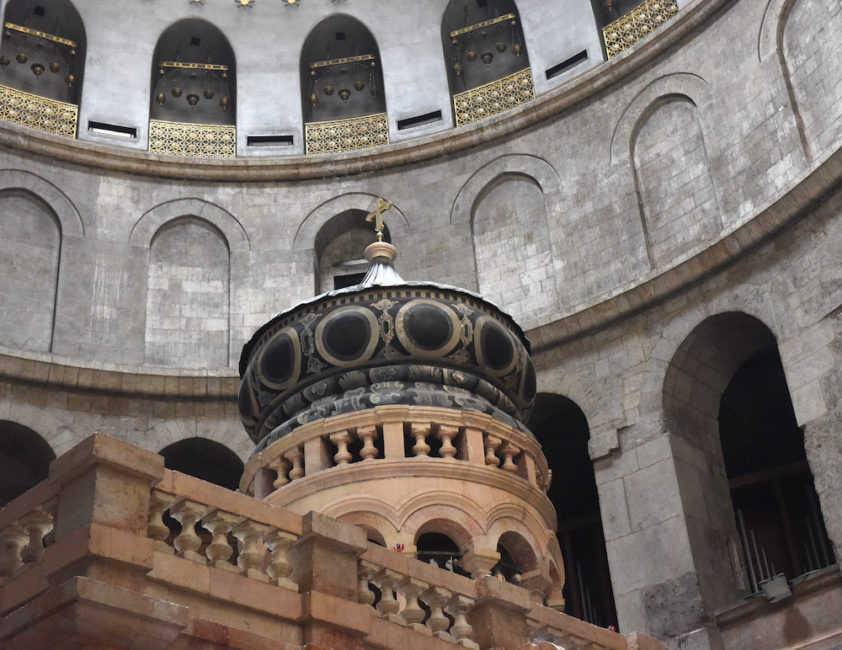Speakers at a July 18 conference in Washington argued that restoring churches in violence-plagued sections of the Middle East will help foster the return of Christians who fled the strife, as well as introduce greater stability to the region.
"Billions of dollars will be needed to reconstruct and rehabilitate the holy places in Syria," said Archimandrite Alexi Chehadeh, a member of the ecumenical relations department of the Greek Orthodox Church.
Despite that price tag, "it might be more difficult to rebuild the human," Archimandrite Chehadeh suggested, noting that "50% of the Christian community has left Syria in the past eight years."
He said of his Christian counterparts in the region, "We have to cooperate with each other, not only in Syria but in the entire Middle East. We have to cooperate with each other, not compete against each other," adding, "It is easy to love one another, but to practice -- that is the problem."
Archimandrite Chehadeh and others spoke at a forum, "Christian Holy Sites & Holy Spaces in the Middle East," co-sponsored by the International Community of the Holy Sepulcher and the Hudson Institute's Working Group on Christians & Religious Pluralism in the Middle East, and was held in conjunction with the State Department's Ministerial to Advance Religious Freedom.
Father Salar Kajo, a priest of the Chaldean Diocese of Alqosh, Iraq, in the Ninevah Plains, said some reconstruction work has begun with U.S. government help. He pointed to the synagogue of the Old Testament prophet Nahum. "This place suffered many things during the regime of Saddam Hussein," he added. "This was neglected and many parts of this building are destroyed and closed."
"The first place people visited after the liberation (from Islamic State) was the monasteries and churches," he added. "I want to tell you why: It was not just their house or their work that they left for three or four years because of ISIS. It was their holy places, their identity."
However, "we will not speak about the writings on the walls against Christians," Father Kajo said. "The Christians were very shocked at what they saw after the liberation." But the restorations, he added, are "signs of hope. We will return because of these places." For others, he noted, "it is very difficult because of the situation and the security."
"How Christians in Iraq feel about their sacred places," said Lord David Alton, a member of the British House of Lords, is the same as how Westerners felt about Paris' Cathedral of Notre Dame when fire ravaged the edifice this spring.
Alton said that, according to UNESCO, 22 of the 38 endangered world cultural heritage sites are in the Middle East. He added that the now-vanquished Islamic State's bid to lay waste to churches and other holy sites in areas over which they had control was not only to destroy the past but "their attempt to define the future as well."
Nermein Riad of Coptic Orphans in Egypt recalled that, when the Muslim Brotherhood "came after the Christians with a vengeance" in 2013, "I always wondered, why did they come after the churches, and not the Copts themselves?" When asking a Coptic priest, "What can we do for you?" Riad remembered the reply did not have to do with identity cards, the segregation of Christian children in schools or the schools' curriculum. His reply instead: "Protect the churches."
Coptic churches have operated soccer teams, coffee shops and even hair salons when Christians have been frozen out of Egyptian society. "Churches have become the nucleus of the Christian community," Riad said. "This is where children go for lessons, for medical care, sometimes for job training. Churches have become a place of refuge from the message that somehow we are second-class citizens."
Anglican Father Dean Hosam Naoum, pastor of St. George's Cathedral in Jerusalem, took note of the thinning out of Christians in the Holy Land.
"Christianity has been quite substantial in the Holy Land," registering at 27% of the population in 1922, Father Naoum said. "Today it's less than 2%." In Jerusalem itself, "the holy city had 40,000 Christians. That was 70 years ago. Today we have 2,000 -- and less than 6,000 in the whole district of Jerusalem," he added.
"The exodus of the Christian from Jerusalem and the whole Middle East is a concerning issue for us," Father Naoum said. An Anglican hospital in the Gaza Strip still serves Palestinians after more than a century, he added, but "today we have no Anglicans there."

